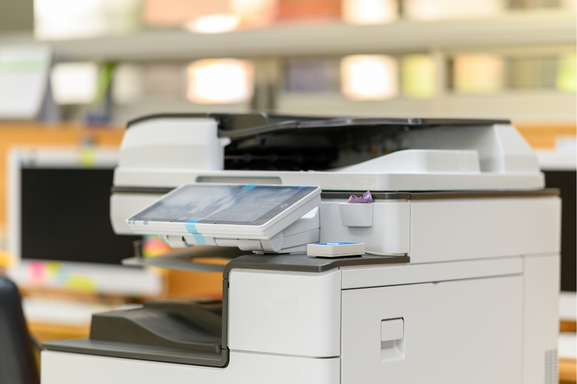Buying Office Equipment – Critical Mistakes You Must Avoid
Office equipment is a wide-ranging term. Everything from the printers, copiers, computers, and servers your people use fall under the umbrella of office equipment.
Because of this, it’s easy for businesses to make mistakes when purchasing their equipment. For example, something as simple as failing to research a printer properly could lead to you purchasing a device that isn’t suitable for your company’s needs. While that’s an irritating enough mistake for a small business, imagine if a larger company makes that same mistake. It could purchase dozens, or even hundreds, of the same printer before realizing it isn’t fit for purpose.
As a business owner or leader, you need to avoid the mistakes that lead to so many companies having inadequate office equipment. These are four critical blunders to keep an eye on and avoid.
Mistake No. 1 – Not Asking for Employee Input on Office Equipment
What do your employees need from their equipment? If you’re buying printers, are there specific needs to fulfill in terms of print speed and quality? For copiers, are your people okay with devices that do nothing but copy documents, or would they be more efficient with a multifunction copier that can also print and scan?
These are important questions to ask. If you don’t have the answers, you run the risk of purchasing office equipment that doesn’t fully meet your employees’ needs. In the best-case scenario, this mistake lowers productivity levels. In the worst, you end up equipping employees with expensive equipment they can’t even use.
Avoiding this mistake is a simple case of encouraging employee input when making decisions about the equipment you buy. Ask them the questions presented above. Talk to employees about the productivity challenges they face and any issues they have with your existing equipment. Use this information as the foundation in your search for new equipment. After all, it’s your people who are going to use the equipment every day. They likely know what they need better than anyone.
Mistake No. 2 – Prioritize Features
Let’s assume you’re buying a new printer.
Every printer you examine comes with an array of features. However, these features aren’t common among all printers. Some may offer a faster page-per-minute print speed while others can offer duplex printing or can handle different paper sizes. If you’re working on a budget, you can’t simply buy a printer that offers every possible feature.
You need to prioritize based on the features that are most important for your business.
Let’s say you have a fast-paced legal office. Paper documents are crucial for your records and trails. Often, employees need these documents as quickly as possible. Thankfully, they rarely need documents that differ in size from standard or legal size. As a result, focusing on a high page-per-minute print speed is a good choice here, meaning a laser printer is probably the best choice.
Alternatively, you may work for a marketing company. In that case, speed is secondary to the end quality of the materials you produce. Furthermore, you may need to be able to print marketing materials in varying sizes based on your clients’ needs. As such, you should focus on printers that offer quality printouts in varying media sizes. Inkjet printers tend to fulfill these needs better than laser printers.
These examples apply to all types of office equipment. You need to know what’s most important to your business and its clients before choosing a device.
Mistake No. 3 – Cheaper Isn’t Always Better
Your budget will always be a key concern when buying office supplies and equipment. That means the cost of whatever you buy influences your decisions. Sadly, this fact often leads to business owners focusing on the price ahead of everything else. The result is that the company ends up with a poorly functioning device that costs more in repairs and maintenance over the long run than a more expensive version of the same equipment.
This isn’t to say that office equipment can’t be both cost-effective and high quality.
Instead, the mistake made is often a lack of research. If a product’s price seems too low for the market, look into why that is. You may discover that the product has a low lifespan compared to its more expensive alternatives. Or, it may lack key features that boost productivity, meaning your efforts to spend less lead to more time wasted in the long run.
The key point is that price shouldn’t be your main determining factor when buying office equipment. Instead, focus on meeting your company’s needs before searching for equipment that meets those needs at a low price.
Mistake No. 4 – Forgetting About Consumables
Many pieces of office equipment have consumables that you need to purchase regularly. Printers need drum units or ink cartridges. Copiers run out of ink or toner, necessitating replacement.
When chasing a deal, many companies forget about the ongoing costs of these consumables. This could lead to them buying cheaper office equipment that costs them more in the long run because the consumables cost more.
Let’s say you have a choice between a $300 copier and a $1,000 copier. Both offer the same features, which seems to make the choice obvious. However, the toner cartridges for the cheaper copier cost $150 each and only last long enough for a month’s worth of copying. By contrast, the cartridges for the most expensive copier also cost $150 but last for two months.
In one year, you’ll spend $1,800 on toner for the $300 copier or $900 with the $1,000 copier. As we can see, the consumables for the cheaper machine end up creating a higher cost burden in the long run.
These are just example figures. Still, they demonstrate the importance of examining the ongoing costs of office equipment when figuring out what to buy.
Avoid Critical Office Equipment Mistakes
By avoiding the mistakes in this article, you equip your company with quality office equipment while saving money in the process. Encourage your staff to provide feedback on what they need and avoid buying equipment that offers more features than you need. And remember that cheaper doesn’t always mean better, both from a quality standpoint and when it comes to ongoing costs.
Now that you know the mistakes to steer clear of, it’s time to find quality office equipment. At Stargel Office Solutions, we provide a range of equipment to companies in Houston and the surrounding area. If you’re looking for scanners, printers, or multifunction systems, get in touch and we’ll help you find what you need.



